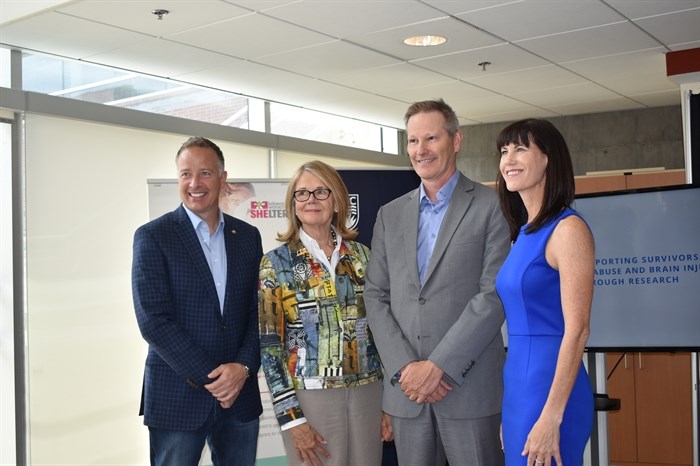
From left to right: Kelowna-Lake Country MP Stephen Fuhr, UBC Deputy Vice-Chancellor and Principal Deborah Buszard, Professor Paul van Donkelaar and Kelowna Women’s Shelter Executive Director Karen Mason
(BRIE WELTON / iNFOnews.ca)
June 28, 2019 - 1:46 PM
KELOWNA -For every NHL player who suffers a concussion during the season, picture 7,000 Canadian women suffering the same injury only at the hands of a loved one.
It's a growing problem that needs an increased level of attention and a research study on brain injuries in women who have experienced intimate partner violence will give it just that, receiving a $1 million boost from the federal government today.
"In January 2018, the Government of Canada launched the Gender-Based Violence Program," said Kelowna-Lake Country MP Stephen Fuhr announcing the funds. "The GBV complements existing programs and helps organizations working in the GBV sector to develop and implement tangible practices to gaps in support for survivors and their families."
The federal government invested more than $50 million in nearly 60 projects under the GBV to support survivors.
Head researcher Professor Paul van Donkelaar shed light on why this research is crucial.
"What we found so far is shocking. In terms of incidence, we’ve estimated that for every NHL player who suffers a concussion during the season, approximately 7,000 Canadian women suffer the same injury at the hands of their intimate partner each year,” said van Donkelaar. "This equates to about 250,000 new cases every year."
Professor van Donkelaar has spent the last three years undertaking a community-based research project designed to better understand the incidence and characteristics of intimate partner violence.
Their research shows that symptoms resulting from this domestic abuse include chronic headaches, difficulty concentrating, nausea, and dizziness, all of which are chronic. These injuries cause deficits in cognition that have the potential to lead to disorders like dementia and Alzheimers.
Van Donkelaar’s partner is Karen Mason, executive director of the Kelowna Women’s Shelter, who shared her perspective on why the project is important.
“A woman or girl is killed in this country two and a half times a week, usually by a family member or male intimate partner,” she said. “One in three of us will experience violence at the hands of a male partner in our lifetime.”
Mason stressed the importance of educating her staff on what traumatic injury looks like, and thus properly address a woman’s needs and provide her with the proper support.
“We have the privilege to start educating not only our staff at Kelowna Women’s Shelter but frontline workers at shelters across this province and across the country,” said Mason. “It also means we can create and pilot test what we’re calling a Community Support Network so that we can identify women who may have experience a [traumatic brain injury] and feed her into a system that is designed to her and her particular needs.”
Whether this is medical care, neurological support and counselling, or even more education, the Community Support Network will function as a support system for women which has not existed until now.
To contact a reporter for this story, email Brie Welton or call (250) 801-9235 or email the editor. You can also submit photos, videos or news tips to the newsroom and be entered to win a monthly prize draw.
We welcome your comments and opinions on our stories but play nice. We won't censor or delete comments unless they contain off-topic statements or links, unnecessary vulgarity, false facts, spam or obviously fake profiles. If you have any concerns about what you see in comments, email the editor in the link above.
News from © iNFOnews, 2019